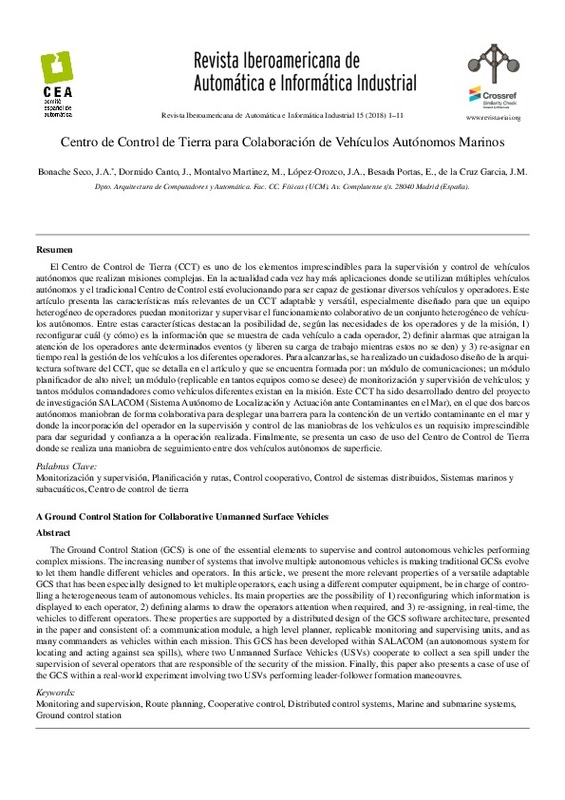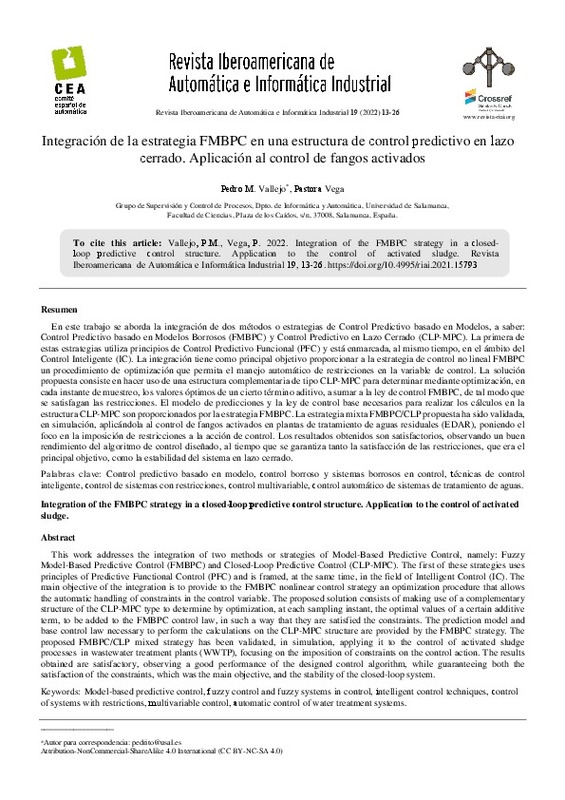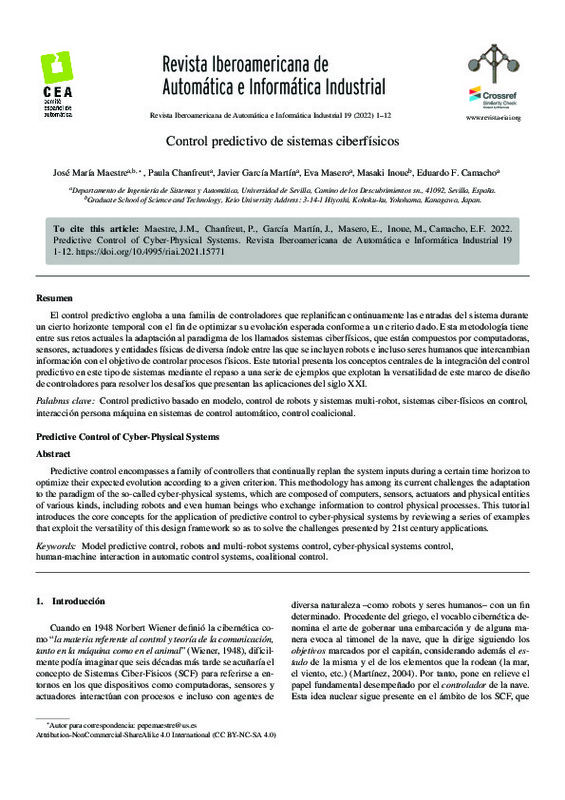JavaScript is disabled for your browser. Some features of this site may not work without it.
Buscar en RiuNet
Listar
Mi cuenta
Estadísticas
Ayuda RiuNet
Admin. UPV
Centro de Control de Tierra para Colaboración de Vehículos Autónomos Marinos
Mostrar el registro sencillo del ítem
Ficheros en el ítem
| dc.contributor.author | Bonache Seco, J.A.
|
es_ES |
| dc.contributor.author | Dormido Canto, J.
|
es_ES |
| dc.contributor.author | Montalvo Martinez, M.
|
es_ES |
| dc.contributor.author | López-Orozco, J.A.
|
es_ES |
| dc.contributor.author | Besada Portas, E.
|
es_ES |
| dc.contributor.author | de la Cruz Garcia, J.M.
|
es_ES |
| dc.date.accessioned | 2020-05-14T11:51:09Z | |
| dc.date.available | 2020-05-14T11:51:09Z | |
| dc.date.issued | 2017-12-05 | |
| dc.identifier.issn | 1697-7912 | |
| dc.identifier.uri | http://hdl.handle.net/10251/143196 | |
| dc.description.abstract | [ES] El Centro de Control de Tierra (CCT) es uno de los elementos imprescindibles para la supervisión y control de vehículos autónomos que realizan misiones complejas. En la actualidad cada vez hay más aplicaciones donde se utilizan múltiples vehículos autónomos y el tradicional Centro de Control está evolucionando para ser capaz de gestionar diversos vehículos y operadores. Este artículo presenta las características más relevantes de un CCT adaptable y versátil, especialmente diseñado para que un equipo heterogéneo de operadores puedan monitorizar y supervisar el funcionamiento colaborativo de un conjunto heterogéneo de vehículos autónomos. Entre estas características destacan la posibilidad de, según las necesidades de los operadores y de la misión, 1) reconfigurar cuál (y cómo) es la información que se muestra de cada vehículo a cada operador, 2) definir alarmas que atraigan la atención de los operadores ante determinados eventos (y liberen su carga de trabajo mientras estos no se den) y 3) re-asignar en tiempo real la gestión de los vehículos a los diferentes operadores. Para alcanzarlas, se ha realizado un cuidadoso diseño de la arquitectura software del CCT, que se detalla en el artículo y que se encuentra formada por: un módulo de comunicaciones; un módulo planificador de alto nivel; un módulo (replicable en tantos equipos como se desee) de monitorización y supervisión de vehículos; y tantos módulos comandadores como vehículos diferentes existan en la misión. Este CCT ha sido desarrollado dentro del proyecto de investigación SALACOM (Sistema Autónomo de Localización y Actuación ante Contaminantes en el Mar), en el que dos barcos autónomos maniobran de forma colaborativa para desplegar una barrera para la contención de un vertido contaminante en el mar ydonde la incorporación del operador en la supervisión y control de las maniobras de los vehículos es un requisito imprescindible para dar seguridad y confianza a la operación realizada. Finalmente, se presenta un caso de uso del Centro de Control de Tierra donde se realiza una maniobra de seguimiento entre dos vehículos autónomos de superficie. | es_ES |
| dc.description.abstract | [EN] The Ground Control Station (GCS) is one of the essential elements to supervise and control autonomous vehicles performing complex missions. The increasing number of systems that involve multiple autonomous vehicles is making traditional GCSs evolve to let them handle dierent vehicles and operators. In this article, we present the more relevant properties of a versatile adaptable GCS that has been especially designed to let multiple operators, each using a dierent computer equipment, be in charge of controlling a heterogeneous team of autonomous vehicles. Its main properties are the possibility of 1) reconfiguring which information is displayed to each operator, 2) defining alarms to draw the operators attention when required, and 3) re-assigning, in real-time, the vehicles to dierent operators. These properties are supported by a distributed design of the GCS software architecture, presented in the paper and consistent of: a communication module, a high level planner, replicable monitoring and supervising units, and as many commanders as vehicles within each mission. This GCS has been developed within SALACOM (an autonomous system for locating and acting against sea spills), where two Unmanned Surface Vehicles (USVs) cooperate to collect a sea spill under the supervision of several operators that are responsible of the security of the mission. Finally, this paper also presents a case of use of the GCS within a real-world experiment involving two USVs performing leader-follower formation maneouvres. | es_ES |
| dc.description.sponsorship | Los autores del art´ıculo quieren agradecer al Ministerio de Econom´ıa y Competitividad español su apoyo a través del proyecto SALACOM (DPI2013-46665-C2-1-R). | es_ES |
| dc.language | Español | es_ES |
| dc.publisher | Universitat Politècnica de València | es_ES |
| dc.relation.ispartof | Revista Iberoamericana de Automática e Informática industrial | es_ES |
| dc.rights | Reconocimiento - No comercial - Sin obra derivada (by-nc-nd) | es_ES |
| dc.subject | Monitoring and supervision | es_ES |
| dc.subject | Route planning | es_ES |
| dc.subject | Cooperative control | es_ES |
| dc.subject | Distributed control systems | es_ES |
| dc.subject | Marine and submarine systems | es_ES |
| dc.subject | Ground control station | es_ES |
| dc.subject | Monitorización y supervisión | es_ES |
| dc.subject | Planificación y rutas | es_ES |
| dc.subject | Control cooperativo | es_ES |
| dc.subject | Control de sistemas distribuidos | es_ES |
| dc.subject | Sistemas marinos y subacuáticos | es_ES |
| dc.subject | Centro de control de tierra | es_ES |
| dc.title | Centro de Control de Tierra para Colaboración de Vehículos Autónomos Marinos | es_ES |
| dc.title.alternative | A Ground Control Station for Collaborative Unmanned Surface Vehicles | es_ES |
| dc.type | Artículo | es_ES |
| dc.identifier.doi | 10.4995/riai.2017.8737 | |
| dc.relation.projectID | info:eu-repo/grantAgreement/MINECO//DPI2013-46665-C2-1-R/ES/SISTEMA AUTONOMO PARA LA LOCALIZACION Y ACTUACION ANTE CONTAMINANTES EN EL MAR/ | es_ES |
| dc.rights.accessRights | Abierto | es_ES |
| dc.description.bibliographicCitation | Bonache Seco, J.; Dormido Canto, J.; Montalvo Martinez, M.; López-Orozco, J.; Besada Portas, E.; De La Cruz Garcia, J. (2017). Centro de Control de Tierra para Colaboración de Vehículos Autónomos Marinos. Revista Iberoamericana de Automática e Informática industrial. 15(1):1-11. https://doi.org/10.4995/riai.2017.8737 | es_ES |
| dc.description.accrualMethod | OJS | es_ES |
| dc.relation.publisherversion | https://doi.org/10.4995/riai.2017.8737 | es_ES |
| dc.description.upvformatpinicio | 1 | es_ES |
| dc.description.upvformatpfin | 11 | es_ES |
| dc.type.version | info:eu-repo/semantics/publishedVersion | es_ES |
| dc.description.volume | 15 | es_ES |
| dc.description.issue | 1 | es_ES |
| dc.identifier.eissn | 1697-7920 | |
| dc.relation.pasarela | OJS\8737 | es_ES |
| dc.contributor.funder | Ministerio de Economía y Competitividad | es_ES |
| dc.description.references | ASTM, 2017. Committee F41 on unmanned maritime vehicle systems (umvs). [Online] https://www.astm.org/COMMITTEE/F41.htm. | es_ES |
| dc.description.references | ASV, 2017. Asview control system. [Online] http://asvglobal.com/asviewcontrol-system/. | es_ES |
| dc.description.references | Besada-Portas, E., Lopez-Orozco, J. A., Besada, J., Jesus, M., 2011. Multisensor fusion for linear control systems with asynchronous, out-of-sequence and erroneous data. Automatica 47 (7), 1399-1408. https://doi.org/10.1016/j.automatica.2011.02.030 | es_ES |
| dc.description.references | Besada-Portas, E., Lopez-Orozco, J. A., de la Cruz, J., 2002. Unified fusion system based on bayesian networks for autonomous mobile robots. In: Information Fusion, 2002. Proceedings of the Fifth International Conference on. Vol. 2. IEEE, pp. 873-880. https://doi.org/10.1109/ICIF.2002.1020900 | es_ES |
| dc.description.references | Bonache Seco, J. A., López Orozco, J. A., Besada Portas, E., de la Cruz, J. M., 2016. Centro de control versátil: Estado actual y evolución hacia la adaptabilidad. CEA, pp. 979-986. | es_ES |
| dc.description.references | Bürkle, A., Segor, F., Kollmann, M., Sch¨onbein, R., 2011. Universal ground control station for heterogeneous sensors. Journal On Advances in Telecommunications, IARIA 3 (3), 152-161. | es_ES |
| dc.description.references | Burmeister, H.-C., Bruhn, W., Rødseth, Ø. J., Porathe, T., 2014. Autonomous unmanned merchant vessel and its contribution towards the e-navigation implementation: The munin perspective. International Journal of e-Navigation and Maritime Economy 1, 1-13. | es_ES |
| dc.description.references | Cummings, M. L., How, J. P., Whitten, A., Toupet, O., 2012. The impact of human-automation collaboration in decentralized multiple unmanned vehicle control. Proceedings of the IEEE 100 (3), 660-671. https://doi.org/10.1109/JPROC.2011.2174104 | es_ES |
| dc.description.references | de la Cruz, J. M., Lopez-Orozco, A, J., Besada Portas, E., Aranda Almansa, J., 2016. Control de formaciones de vehículos marinos de superficie con restricciones de entrada. CEA, pp. 1044-1051. | es_ES |
| dc.description.references | de la Cruz, J. M., Lopez-Orozco, A, J., Besada Portas, E., Moreno Salinas, D., Aranda Almansa, J., 2014. Seguimiento de caminos para formaciones de vehículos marinos de superficie. | es_ES |
| dc.description.references | de la Cruz, J. M., Lopez-Orozco, J. A., Besada-Portas, E., Aranda-Almansa, J., 2015. A streamlined nonlinear path following kinematic controller. In: 2015 IEEE International Conference on Robotics and Automation (ICRA). IEEE, pp. 6394-6401. https://doi.org/10.1109/ICRA.2015.7140097 | es_ES |
| dc.description.references | Heo, J., Kim, S., Kwon, Y., 2016. Design of ground control station for operation of multiple combat entities. Journal of Computer and Communications 4, 66-71. https://doi.org/10.4236/jcc.2016.45010 | es_ES |
| dc.description.references | Lalish, E., Morgansen, K. A., 2008. Decentralized reactive collision avoidance for multivehicle systems. In: Proceedings of the 47th IEEE Conference on Decision and Control. IEEE, pp. 1218-1224. https://doi.org/10.1109/CDC.2008.4738894 | es_ES |
| dc.description.references | Lapierre, L., Soetanto, D., 2007. Nonlinear path-following control of an auv. Ocean engineering 34 (11), 1734-1744. https://doi.org/10.1016/j.oceaneng.2006.10.019 | es_ES |
| dc.description.references | LibrePilot, 2015. Software suite to control multicopter and other rc-models. [Online] https://www.librepilot.org/site/index.html, accedido en marzo de 2017. | es_ES |
| dc.description.references | Lindemuth, M., Murphy, R., Steimle, E., Armitage, W., Dreger, K., Elliot, T., Hall, M., Kalyadin, D., Kramer, J., Palankar, M., et al., 2011. Sea robot assisted inspection. IEEE robotics & automation magazine 18 (2), 96-107. https://doi.org/10.1109/MRA.2011.940994 | es_ES |
| dc.description.references | MAVLINK, 2017. Micro air vehicle communication protocol. [Online] http://qgroundcontrol.org/mavlink/start, accedido en Marzo, 2017. | es_ES |
| dc.description.references | Moreno-Salinas, D., Besada-Portas, E., López-Orozco, J., Chaos, D., de la Cruz, J., Aranda, J., 2015. Symbolic regression for marine vehicles identification. IFAC-PapersOnLine 48 (16), 210-216. https://doi.org/10.1016/j.ifacol.2015.10.282 | es_ES |
| dc.description.references | Mupparapu, S. S., Chappell, S. G., Komerska, R. J., Blidberg, D. R., Nitzel, R., Benton, C., Popa, D. O., Sanderson, A. C., 2004. Autonomous systems monitoring and control (asmac)-an auv fleet controller. In: Autonomous Underwater Vehicles, 2004 IEEE/OES. IEEE, pp. 119-126. | es_ES |
| dc.description.references | Murphy, R. R., Steimle, E., Griffin, C., Cullins, C., Hall, M., Pratt, K., 2008. Cooperative use of unmanned sea surface and micro aerial vehicles at hurricane wilma. Journal of Field Robotics 25 (3), 164-180. https://doi.org/10.1002/rob.20235 | es_ES |
| dc.description.references | Park, S., Deyst, J., How, J. P., 2007. Performance and lyapunov stability of a nonlinear path following guidance method. Journal of Guidance, Control, and Dynamics 30 (6), 1718-1728. https://doi.org/10.2514/1.28957 | es_ES |
| dc.description.references | Patterson, M. C., Mulligan, A., Boiteux, F., 2013. Safety and security applications for micro-unmanned surface vessels. In: 2013 OCEANS-San Diego. IEEE, pp. 1-6. | es_ES |
| dc.description.references | QGroundControl, 2017. A uav control station. [Online] http://qgroundcontrol.com/, accedido en Marzo de 2017. | es_ES |
| dc.description.references | Ribas, D., Palomeras, N., Ridao, P., Carreras, M., Mallios, A., 2012. Girona 500 auv: From survey to intervention. IEEE ASME Transactions on Mechatronics 17 (1), 46-53. https://doi.org/10.1109/TMECH.2011.2174065 | es_ES |
| dc.description.references | STANAG4586, 2012. Standard interfaces of uav control system (ucs) for nato uav interoperability, ed. 3. NATO standardization agency (nsa). [Online] http://nso.nato.int/nso/nsdd/listpromulg.html. | es_ES |
| dc.description.references | Sutton, R., Sharma, S., Xao, T., 2011. Adaptive navigation systems for an unmanned surface vehicle. Journal of Marine Engineering & Technology 10 (3), 3-20. | es_ES |
| dc.description.references | Walter, B. E., Knutzon, J. S., Sannier, A. V., Oliver, J. H., 2004. Virtual uav ground control station. In: AIAA 3rd Unmanned Unlimited Technical Conference, Workshop and Exhibit. https://doi.org/10.2514/6.2004-6320 | es_ES |
| dc.description.references | WGSM, 2017. Wave glider management system. [Online] https://www.liquidrobotics.com/platform/software/. | es_ES |











